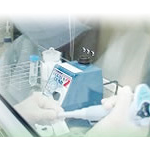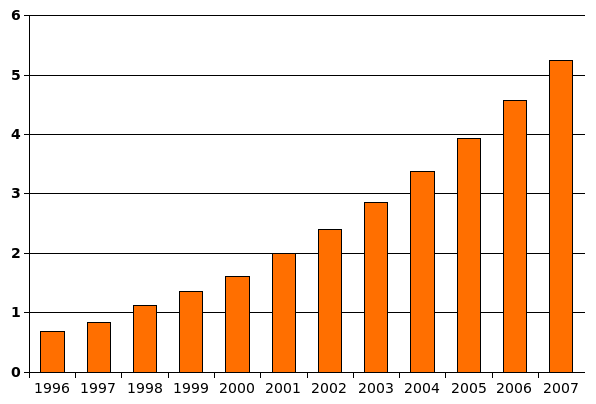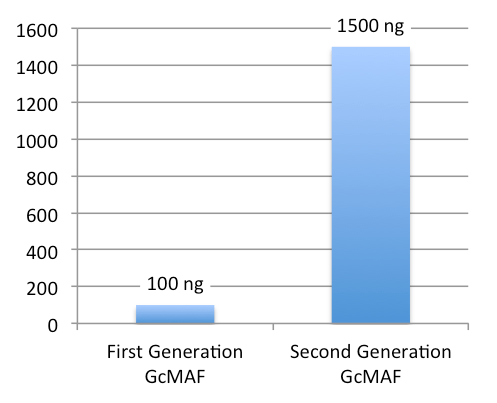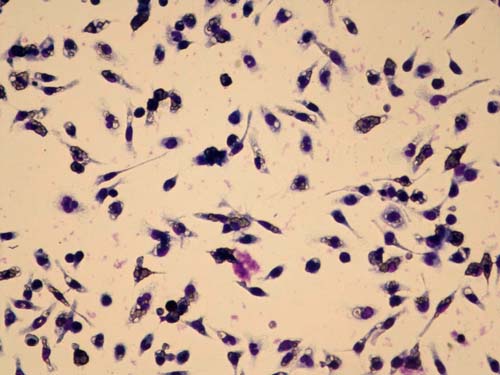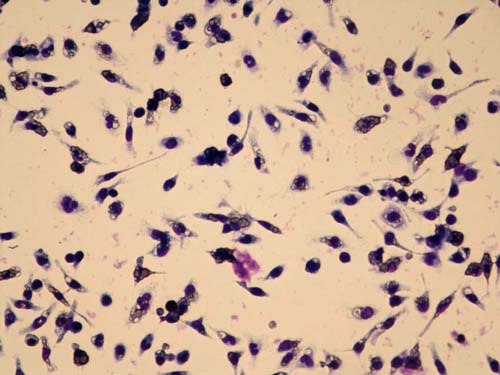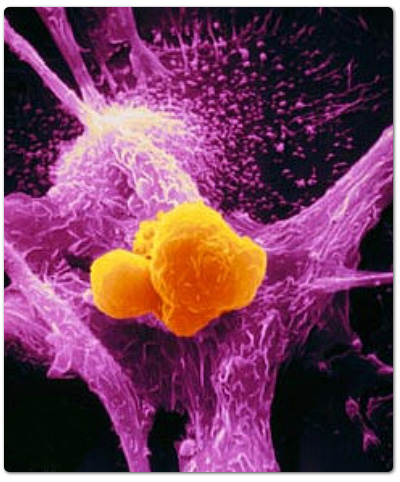
The autologous cancer vaccine is derived from tissue fragments from the patient’s own cancer (tumor) and immunoadjuvants.
What is AFTVac (Autologous Formalin-fixed Tumor Vaccine)?
A very unique cancer (tumor) vaccine
It is a new and innovative cancer vaccine consisting of formalin-fixed or paraffin-embedded tissue fragments derived from patient’s own cancer (tumor) and immunoadjuvants. It is one of the self-vaccines (auto-vaccine or autologous cancer vaccine) without any problematic adverse side effects.
AFTVac is ultimately a “personalized” drug against cancer.
AFTVac is injected into the patient from whom the cancerous tissue has been surgically resected.
AFTVac contains all the unknown cancer-associated antigens unique to that specific patient. The immune cells in that patient will discriminate between the cancer cells and the normal cells after AFTVac injection (once every two weeks for a total of 3 injections on an out-patient basis).
The vaccine has the potential to suppress recurrence, prevent metastasis and treat the residual cancer cells of many types of human cancers after surgical resection.

Background Research and Development
Tumor vaccines aiming to enhance cellular immune responses reported so far consist of either irradiated tumor cells,1-5tumor cell lysates1 co-injected with adjuvant,6, 7 genetically modified tumor cells,8, 9 tumor-associated antigenic peptides,10 peptide-loaded dendritic cells,11 or dendritic cells fused with tumor cells.12, 13 Among these tumor vaccines, tumor-associated antigenic peptides are, unfortunately, only effective for patients carrying matched major histocompatibility complex (MHC) alleles,10 and peptides and tumor cell lysates are rather weak immunogens.
In contrast, antigen pre-loaded dendritic cells may theoretically be promising vaccines11 although the formulation of this vaccine requires complex bench procedures including live cell handling. If one is concerned about usage and acceptability as a treatment in clinical practice, simplicity in administration technique as well as in preparation such as bed-side handling of the vaccine should be key factors. In this respect, DNA vaccines are simple but, unfortunately, occasionally fail to provide sufficient amounts of antigens.14
After administering the tumor vaccine, scientists expect in vivo induction of cytotoxic T lymphocytes (CTL) which recognize and kill the targeted tumor cells in a very specific manner. It has been confirmed and accepted that CTL are far more cytotoxic than lymphokine-activated killer (LAK) cells against cancers.15-24
In animal models, many laboratories have shown that CTL are the major effector cells to suppress cancerous tissue formation challenged with transplantable tumor cell lines and their metastasis and to cure the established tumors.
We, as well as others, have confirmed the effectiveness of in vitro induced autologous CTL in patients harboring recurrent malignant gliomas.25 Also, we found that freshly extirpated and minced brain tumor tissues could be useful targets for induction of autologous CTL from the peripheral blood mononuclear cells (PBMC).26
Furthermore, it was indicated that formalin-fixed paraffin-embedded tumor sections were applicable as the source of tumor antigens,27, 28 and fixed cultured cancer cells could stimulate the expansion of autologous CTL.29 It also has been reported that human CTL can be generated on the fixed adherent blood cells previously loaded with a tumor antigen.30, 31
Concerning the impact in clinical practice, simplicity in preparation and bedside handling of the cancer vaccine is an important factor. In this respect, vaccines including live cells in the formulation are disadvantageous because of the complicated preparation techniques.
AFTVac has been invented as a novel, simple, stable, and clinically effective autologous tumor vaccine based on these scientific knowledge.
Research and references
Case report
2012 Autologous formalin-fixed tumor vaccine suppressed re-recurrence of HCV-related hepatocellular carcinoma following 29 unsuccessful treatments with extensive conventional therapy: a case report (PDF)
Toshio Inui, Inui Cancer Immunotherapy Clinic.
Tadao Ohno, Cell-Medicine, Inc.
References
- Berd, D., Maguire, H.C., Jr., and Mastrangelo, M.J. Induction of cell-mediated immunity to autologous melanoma cells and regression of metastases after treatment with a melanoma cell vaccine preceded by cyclophosphamide. Cancer Res. 46: 2572-2577, 1986.
- Berd, D., Maguire, H.C., Jr., McCue, P. and Mastrangelo, M.J. Treatment of metastatic melanoma with an autologous tumor-cell vaccine: Clinical and immunologic results in 64 patients. J. Clin. Oncol., 8: 1858-1867, 1990.
- Livingston, P.O., Albino, A.P., Chung, T.J., Real, F.X., Houghton, A.N., Oettgen, H.F. and Old, L.J. Serological response of melanoma patients to vaccines prepared from VSV lysates of autologous and allogeneic cultured melanoma cells. Cancer, 55: 713-720, 1985.
- McCune, C.S., O’Donnell, R.W., Marquis, D.M. and Sahasrabudhe, D.M. Renal cell carcinoma treated by vaccines for active specific immunotherapy: correlation of survival with skin testing by autologous tumor cells. Cancer. Immunol. Immunother. 32: 62-66, 1990.
- Soiffer, R., Lynch, T., Mihm, M., Jung, K., Rhuda, C., Schmollinger, J.C, Hodi, F.S., Liebster, L., Lam, P., Mentzer, S., Singer, S., Tanabe, K.K., Cosimi, A.B., Duda, R., Sober, A., Bhan, A., Daley, J., Neuberg, D., Parry, G., Rokovich, J., Richards, L., Drayer, J., Berns, A., Clift, S., Cohen, L.K., Mulligan, R.C. and Dranoff. G. Vaccination with irradiated autologous melanoma cells engineered to secrete human granulocyte-macrophage colony-stimulating factor generates potent antitumor immunity in patients with metastatic melanoma. Proc. Natl. Acad. Sci. USA 95: 13141-13146, 1998.
- Johnston, D. and Bystryn, J.C. Effect of cell wall skeleton and monophosphoryl lipid A adjuvant on the immunogenicity of a murine B16 melanoma vaccine. J. Natl. Cancer. Inst. 83: 1240-1245, 1991.
- Powles, R.L., Russell, J.A., Selby, P.J., Prentice, H.G., Jones, D.R., McElwain, T.J. and Alexander, P. Maintenance of remission in acute myelogenous leukaemia by a mixture of B.C.G. and irradiated leukaemia cells. Lancet 2: 1107-1110, 1977.
- Coutelle, C., Douar, A.M., Colledge, W.H. and Froster, U. The challenge of fetal gene therapy. Nat. Med. 1: 864-866, 1995.
- Huang, L. and Li, S. Liposomal gene delivery: a complex package. Nat. Biotechnol. 15: 620-621, 1997.
- Protti, M.P. and Bellone, M. Immunotherapy: natural versus synthetic peptides. Immunol. Today 19: 98-98, 1998.
- Mayordomo, J.I., Zorina, T., Storkus, W.J., Zitvogel, L., Celluzzi, C., Falo, L.D., Melief, C.J., Ildstad, S.T., Kast, W.M., Deleo, A.B. and Lotze, M.T. Bone marrow-derived dendritic cells pulsed with synthetic tumour peptides elicit protective and therapeutic antitumour immunity. Nat. Med. 1: 1297-1302, 1995.
- Gong, J., Chen, D., Kashiwaba, M. and Kufe, D. Induction of antitumor activity by immunization with fusions of dendritic and carcinoma cells. Nat. Med. 3: 558-561, 1997.
- Guo, Y., Wu, M., Chen, H., Wang, X., Liu, G., Li, G., Ma, J. and Sy, M. S. Effective tumor vaccine generated by fusion of hepatoma cells with activated B cells. Science 263: 518-520, 1994.
- Pardoll, D.M. Cancer vaccines. Nat. Med. vaccine suppl. 4: 525-531, 1998.
- Fisher, R.I., Coltman, C.A., Jr., Doroshow, J.H., Rayner, A.A., Hawkins, M.J., Mier, J.W., Wiernik, P., McMannis, J.D., Weiss, G.R., Margolin, K.A., Gemlo, B.T., Hoth, D.F., Parkinson, D.R. and Paietta, E. Metastatic renal cancer treated with interleukin-2 and lymphokine-activated killer cells – a phase II clinical trial. Ann. Intern. Med. 108: 518-523, 1988.
- Holladay, F.P., Heitz, T. and Wood, G.W. Antitumor activity against established intracerebral gliomas exhibited by cytotoxic T lymphocytes, but not by lymphokine-activated killer cells. J. Neurosurg. 77: 757-762, 1992.
- Ikarashi, H., Fujita, K., Takakuwa, K., Kodama, S., Tokunaga, A., Takahashi, T. and Tanaka, K. Immunomodulation in patients with epithelial ovarian cancer after adoptive transfer of tumor-infiltrating lymphocytes. Cancer Res. 54: 190-196, 1994.
- Ioannides, C.G. and Whiteside, T. T cell recognition of human tumors: Implications for molecular immunotherapy of cancer. Clin. Immunol. Immunopathol. 66: 91-106, 1993.
- Kawakami, Y., Eliyahu, S., Delgado, C.H., Robbins, P.F., Sakaguchi, K., Appella, E., Yannelli, J.R., Adema, G.J., Miki, T. and Rosenberg, S.A. Identification of a human melanoma antigen recognized by tumor-infiltrating lymphocytes associated with in vivo tumor rejection. Proc. Natl. Acad. Sci. USA 91: 6458-6462, 1994.
- Monaco, J.J. A molecular model of MHC class-I-restricted antigen processing. Immunol. Today 13: 173-179, 1992.
- Rosenberg, S.A., Aebersold, P., Cornetta, K., Kasid, A., Morgan, R.A., Moen, R., Karson, E.M., Lotze, M.T., Yang, J.C., Topalian, S.L., Merino, M.J., Culver, K., Miller, A.D., Blaese, R.M. and Anderson, W.F. Gene transfer into humans-immunotherapy of patients with advanced melanoma, using tumor infiltrating lymphocytes modified by retroviral gene transduction. N. Engl. J. Med. 323: 570-578, 1990.
- Rosenberg, S.A., Lotze, M.T., Muul, L.M., Chang, A.E., Avis, F.P., Leitman, S., Linehan, W.N., Robertson, C.N., Lee, R.E., Rubin, J.T., Seipp, C.A., Simpson, C.G. and White, D.E. A progress report on the treatment of 157 patients with advanced cancer using lymphokine-activated killer cells and interleukin-2 or high-dose interleukin-2 alone. N. Engl. J. Med. 316: 889-897, 1987.
- Slingluff, C.L., Cox, A.L., Stover, J.M.J., Moore, M.M., Hunt, D.F. and Engelhard, V.H. Cytotoxic T-lymphocyte response to autologous human squamous cell cancer of the lung: epitope reconstitution with peptides extracted from HLA-Aw68. Cancer Res. 54: 2731-2737, 1994.
- Tjoa, B.A. and Kranz, D.M. Generation of cytotoxic T-lymphocytes to a self-peptide/class I complex: a model for peptide-mediated tumor rejection. Cancer Res. 54: 204-208, 1994.
- Tsurushima, H., Liu, S.Q., Tuboi, K., Matsumura, A., Yoshii, Y., Nose, T., Saijo, K. and Ohno, T. Reduction of end-stage malignant glioma by injection with autologous cytotoxic T lymphosytes, Jpn. J. Cancer Res. 90: 536-545, 1999.
- Tsurushima, H., Liu, S.Q., Tsuboi, K., Yoshii, Y., Nose, T. and Ohno, T. Induction of human cytotoxic T lymphocytes against minced tissues of glioblastoma multiforme. J. Neurosurg. 84: 258-263, 1996.
- Liu, S.Q., Saijo, K., Todoroki, T. and Ohno, T. Induction of human autologous cytoyoxic T lymphocytes on formalin-fixed and paraffin-embedded tumour sections. Nat. Med. 1: 267-271, 1995.
- Liu, S.Q., Shiraiwa, H., Kawai, K., Hayashi, H., Akaza, H., Kim, B.S., Oki, A., Nishida, M., Kubo, T., Hashizaki, K., Saijo, K. and Ohno, T. Tumor-specific autologous cytotoxic T lymphocytes from tissue section. Nat. Med., 2: 1283-1283, 1996.
- Horiuchi, K., Tsurushima, H., Kim, B.S., Liu, S.Q., Saijo, K., Nukiwa, T., Mastumura, M. and Ohno, T. Expansion of human autologous cytotoxic T lymphocytes on fixed target tumor cells. Cytotechnology 26: 119-124, 1998.
- Kim, C., Matsumura, M., Saijo, K. and Ohno, T. In vitro induction of HLA-A2402-restricted and carcinoembryonic-antigen-specific cytotoxic T lymphocytes on fixed autologous peripheral blood cells. Cancer Immunol. Immunother. 47: 90-96, 1998.
- Kim, C.H., Todoroki, T., Matsumura, M., and Ohno, T. Eligibility of antigenic-peptide pre-loaded and fixed adhesive pripheral blood cells for induction of cytotoxic T lymphocytes fro cancer patients with elevated serum CEA levels. J. Cancer Res. Clin. Oncol. 126: 383-390, 2000.
More information
We collaborate with Cell-Medicine, Inc. in the production of this autologous cancer vaccine.
Note
Autologous cancer vaccine therapy is only available to patients within Japan.
Currently, GcMAF is the only immunotherapy available to patients outside Japan.





